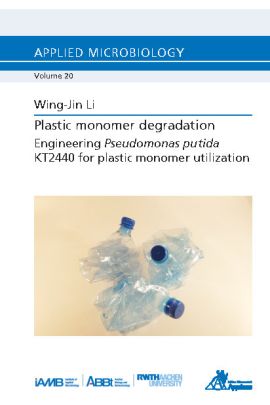Plastics are robust, ubiquitous, versatile materials, which make our everyday life easier. But these polymers properties make them both a blessing and a curse. The environmental impact of plastics is immense, and so far, there are only a few strategies to deal with plastic waste in an environmentally friendly and economically feasible way. To tackle this challenge, a strategy called bio-upcycling was developed, aiming for a biotechnological conversion of plastic waste like PET and PU. These polymers can be hydrolysed by enzymes, releasing monomers like ethylene glycol (EG), 1,4-butanediol (BDO), and adipic acid (AA). These can be utilized as carbon source by microorganisms like the biotechnological workhorse Pseudomonas putida KT2440 to produce value-added compounds from plastic waste.
This thesis enabled P. putida KT2440 to efficiently metabolize the plastic monomers EG, BDO, and AA. Since P. putida KT2440 is not able to grow on EG, adaptive laboratory evolution (ALE) was performed to isolate the enhanced mutants. Genome resequencing and reverse engineering revealed that the deletion of one regulator, gclR, was sufficient to enable growth on EG. The deletion of two additionally identified genes, PP_2046 and PP_2662, could further enhance this growth. With this knowledge, EG metabolism and its regulation in P. putida was further unraveled. A similar ALE-based strategy was applied to enhance growth on BDO and to enlighten underlying degradation pathways. Targets like PP_2046 were identified via genome resequencing, and proteomic analysis gave insights to the involvement of dehydrogenases. With the overexpression of the operon PP_2047-51, higher growth rates were achieved. Further characterizations indicate that BDO may at least in part be metabolized through β-oxidation. Adipic acid metabolism was enabled in P. putida by introducing the heterologous genes dcaAKIJP from Acinetobacter baylyi and subsequent ALE. Furthermore, genome resequencing analysis suggests a hybrid AA metabolic pathway involving DcaAKIJP from A. baylyi combined with parts of native phenylacetate degradation, and other β-oxidation pathways.
In addition to enabling P. putida KT2440 to grow on these substrates individually, a strain was also engineered to metabolize all three of these plastic-derived compounds. Thus, this work sets the basis for bio-upcycling of PET and PU and leads the way for the rational design of a consolidated plastic degrader.
| Autor | Li, Wing-Jin |
|---|---|
| Lieferzeit | 3-4 Tage |
| Gewicht | 0.277 kg |
| Erscheinungsdatum | 18.05.2020 |
Applied Microbiology
Plastic monomer degradation - Engineering Pseudomonas putida KT2440 for plastic monomer utilization
Kurzbeschreibung
The environmental impact of plastic waste is regularly discussed. With bio-upcycling we can use plastic waste as a substrate for biotechnology. Polymers like PET and PU can be hydrolyzed to yield monomers like adipic acid, 1,4-butandiol and ethylene glycol. This work enabled Pseudomonas putida KT2440 to utilize these monomers, and gave insights into their metabolism and its regulation. Hereby, a biological basis to produce value added materials from plastic monomers was set.

